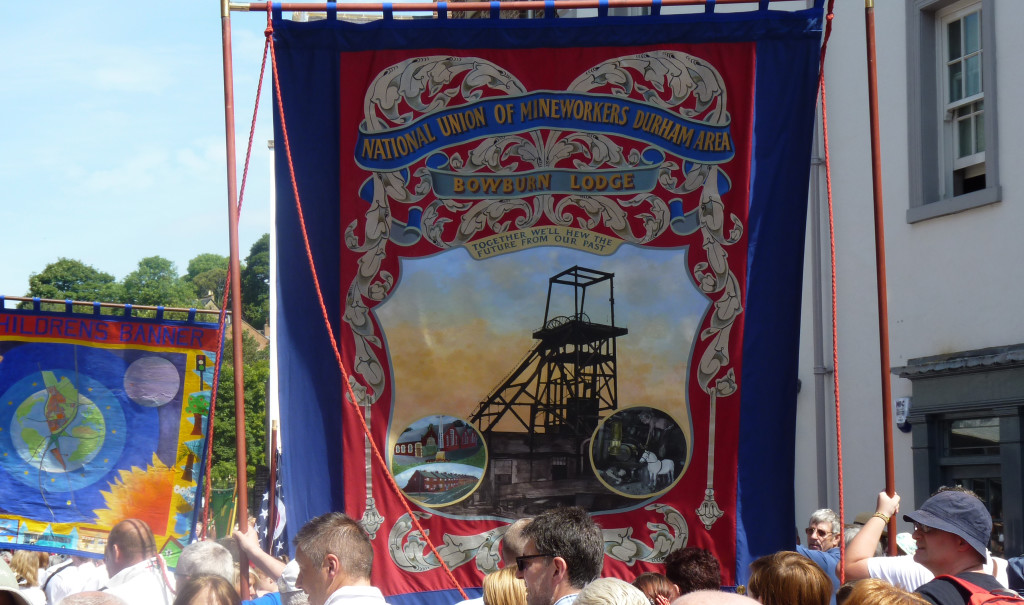At a time when we are told there is a disconnection between politics and people, this weekend’s “Big Meeting” remains an impressive occasion, with an opportunity to create a new space for a debate about the north east’s future, says John Tomaney
Hanging in Sunderland AFC’s Stadium of Light is the banner of the Monkwearmouth Lodge of the Durham Miner’s Association (DMA). The image on the banner depicts the moment in 1869 when the nascent union forced the cancellation of the yearly bond which tied each miner to a coal-owner in a relationship akin to slavery. Providing evidence of the adage that the British labour movement owed more to Methodism than Marx, the motif of the banner quotes from the Book of Isaiah: “Come let us reason together”.
This weekend, tens of thousands of people again will gather behind bands and banners at the Durham Miner’s Gala. At a time when we are told there is a disconnection between politics and people, the “Big Meeting” remains an impressive occasion. The survival of the Gala, which is almost as old as the DMA, is all the more remarkable when we consider that the pits have gone, communities have been transformed for better and for worse and ways of life have altered in unanticipated ways since the death of King Coal. Yet the appeal lingers.
The Gala today is primarily an expression of the importance and resilience of community. Historically though it fulfilled many functions, among which was its role as a place for debate. The Gala traditionally was a space for thinking aloud about how to make a more just, egalitarian and better society. In the aftermath of a general election where there was a widespread sense that the big issues were not discussed and that language of debate was further coarsened, the case for remaking a space for debate is strong.
This need seems especially pressing in places like County Durham and others parts of the north of England. Politically and economically such places seem apart from the rest of England. The electoral map in County Durham remains painted red but with the Conservatives replaced by UKIP as the effective opposition in many places. What does this mean and does it presage future change? The government promises a “northern powerhouse” but what are the implications of this for former mining communities in places like the north east? The region has seen the emergence of new industries and rising living standards for some, but huge social and economic challenges remain. The cultural scene is vibrant despite straitening resources, but region’s media continues to shrink. The Gala was an expression of a way of life and values of solidarity but it is unclear what these mean to today’s young people.
These among many other questions need careful consideration but where is the space for people in the region to debate them in an open and constructive way? With this question in mind the DMA, New Writing North have teamed up to create a new space for a debate about our common future that is in the tradition of the Miners’ Gala. It can be seen in part as a response to Ian Wylie’s recent call for emphasis on listening as well as talking when address issues of common concern.
We’ve called the event Durham Moot. Why Moot? It’s an old English word that, in its adjectival form suggests something subject to debate, dispute, or uncertainty, or as a noun refers, historically, to an assembly held for debate or a regular gathering of people having a common interest. It captures usefully what we are trying to achieve. Come, let us reason together.
John Tomaney is professor of urban and regional planning in the Bartlett School of Planning, University College London and a visiting professor at the Centre for Urban and Regional Development Studies, Newcastle University.
The Durham Moot takes place on Sunday 12 July at the Palace Green Library in Durham where speakers will include author Owen Jones, Simon Henig, leader of Durham County Council, artist Julia Heslop, poet Sean O’Brien and The Northern Correspondent editor Ian Wylie. Click here for further details.
(Views expressed on our website and in our magazines and emails are not necessarily endorsed by The Northern Correspondent.)

